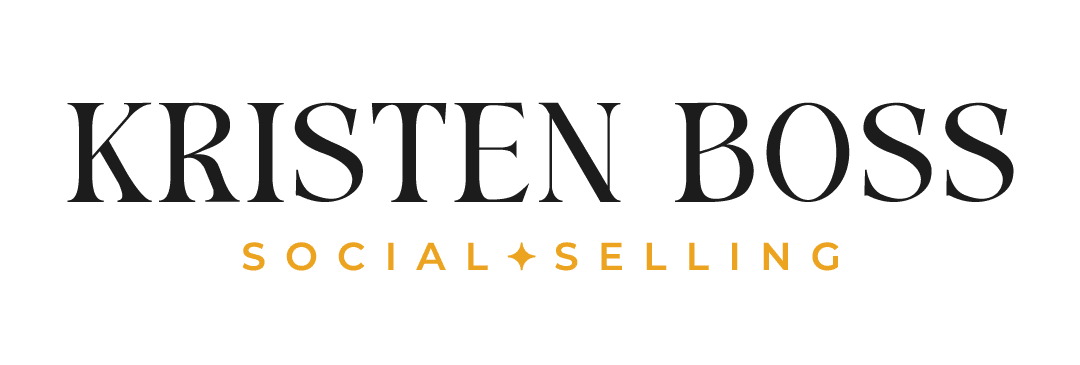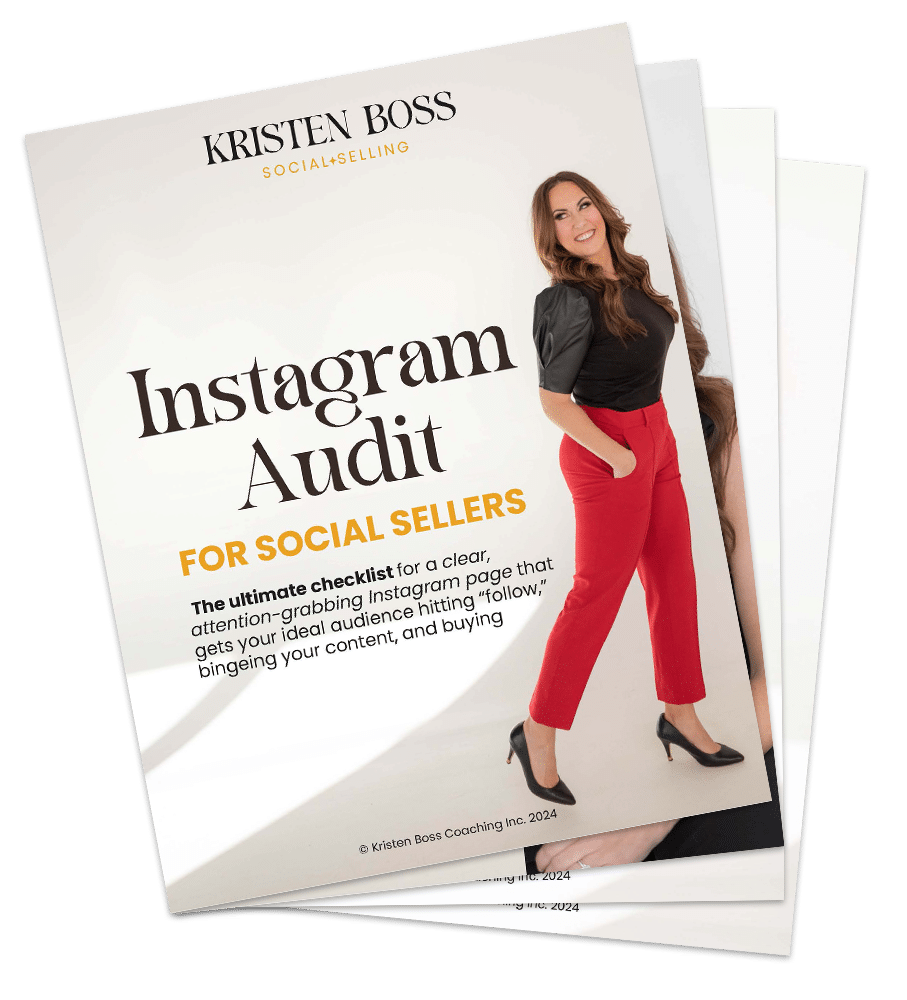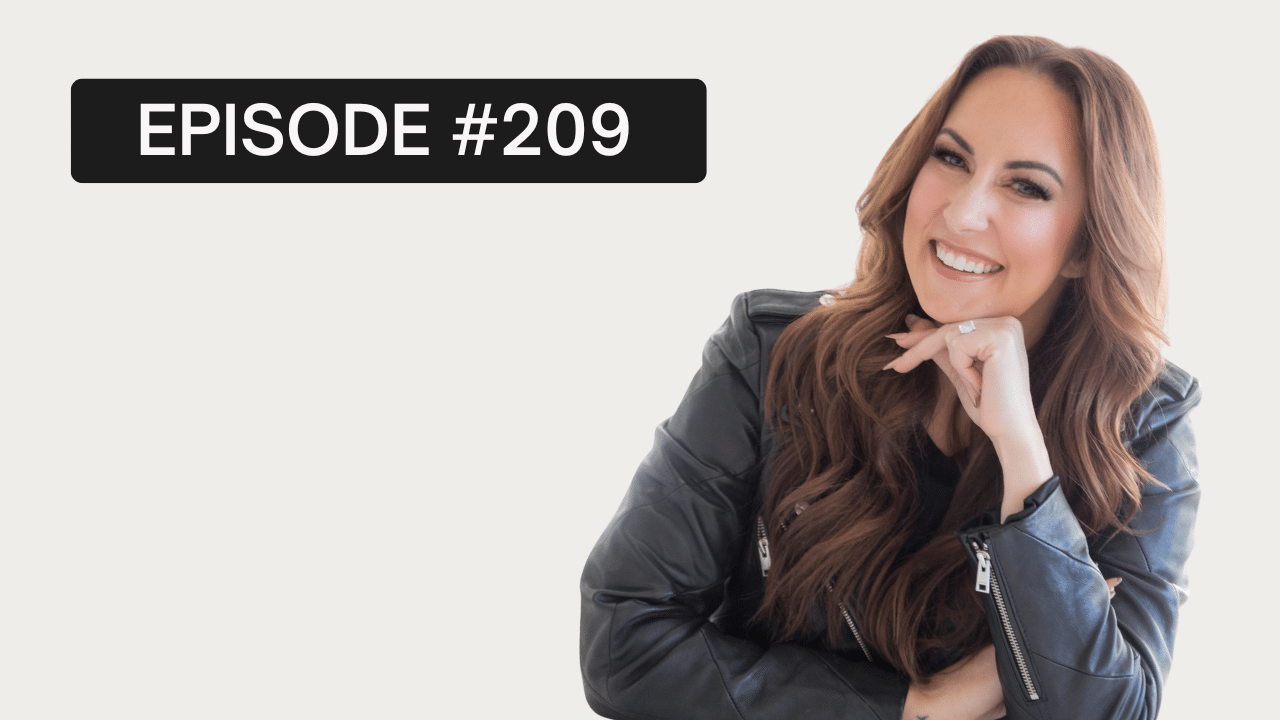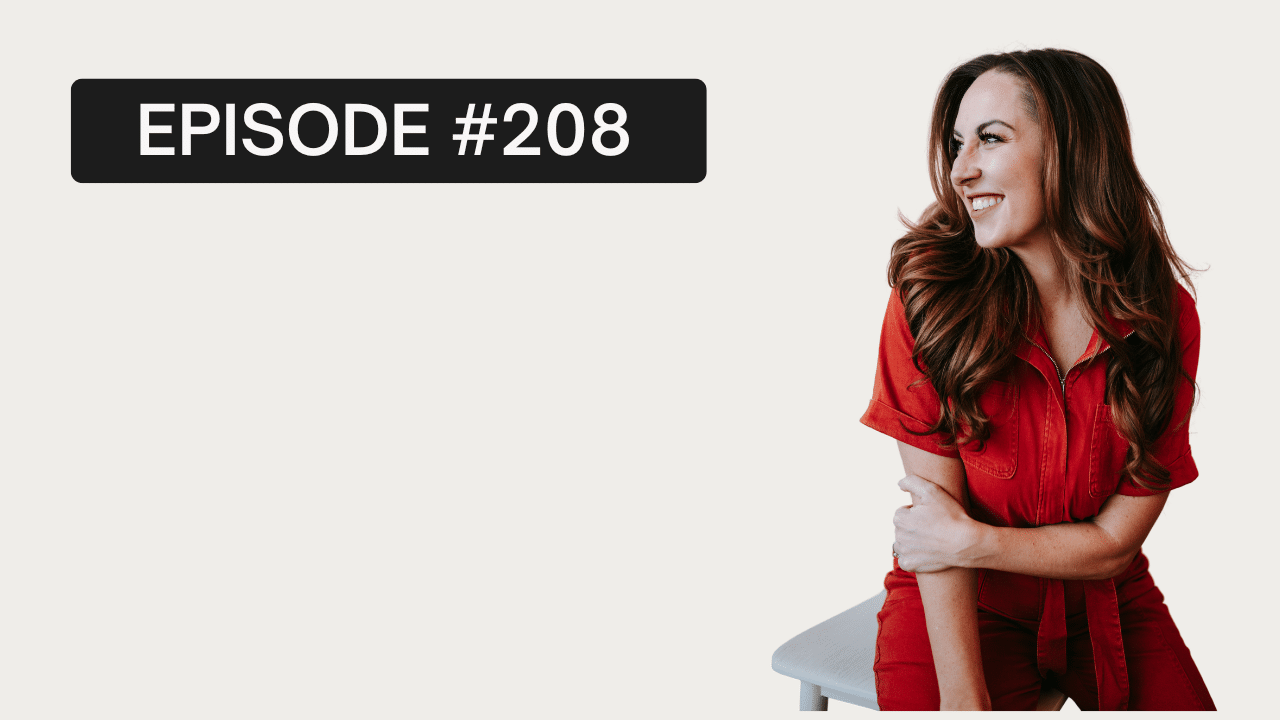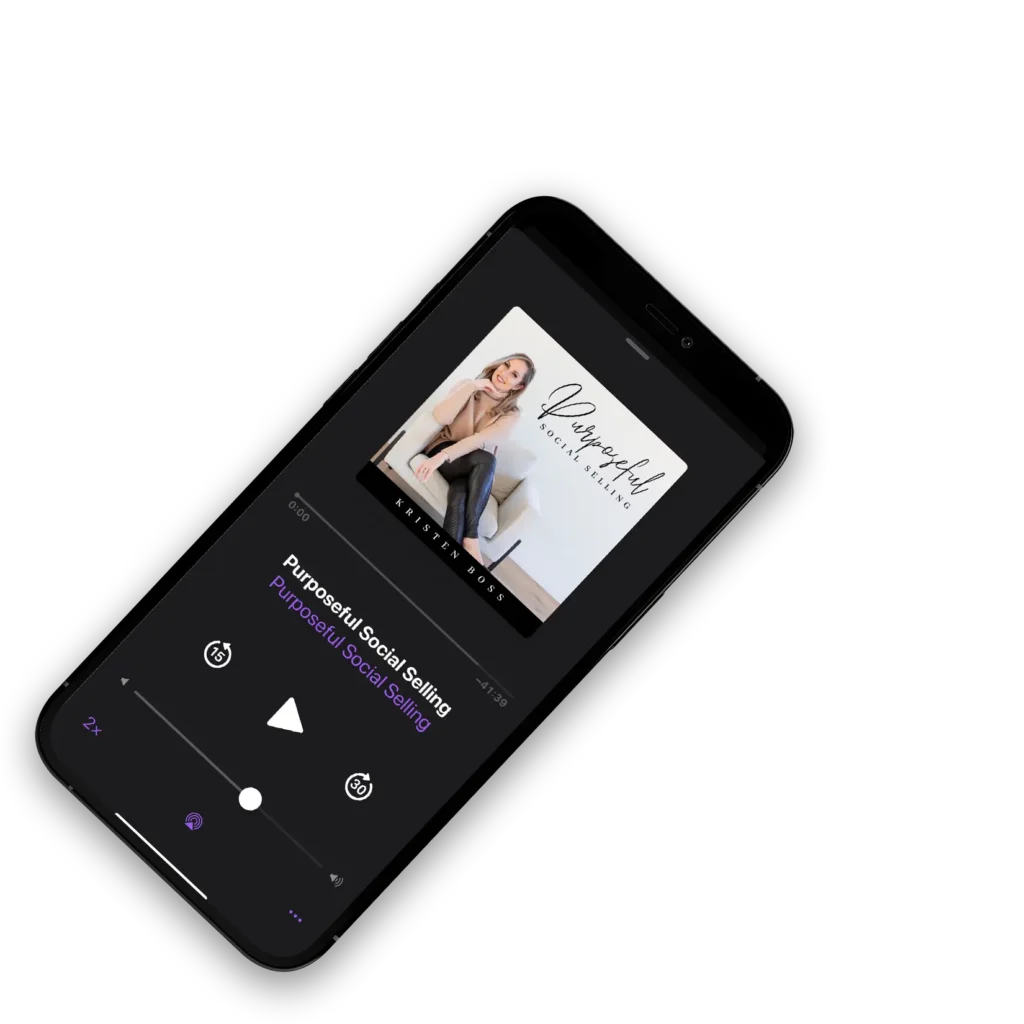In entrepreneurship, the mindset you adopt can be the determining factor between stagnation and success. Kristen introduces listeners to the two distinct mindsets that can shape the trajectory of our entrepreneurial journey. In a compelling “wake up and shake up” episode, she explores the differences between a victim and a visionary and the impact these mindsets will have on your business.
Let’s look at a few highlights:
- Victims tend to use the past as a weapon against themselves, beating themselves up over perceived mistakes or missed opportunities.
- Visionaries, unlike victims, do not allow current circumstances to dictate their outlook. Instead of dwelling on what they lack, they focus on how the work they are doing now will pay off in the future.
- A significant divergence between victims and visionaries lies in their relationship with the past.
- Kristen’s exploration delves into the concept of learned helplessness, challenging us to question where we might have conditioned ourselves into victimhood.
- The visionary path is one of resilience, adaptability, and continuous growth. It’s about seeing challenges as opportunities for improvement and understanding that the present is a stepping stone to a brighter future.
By choosing to be a visionary, cultivating resilience, and learning from the past rather than dwelling in it, you pave the way for business success and a fulfilling and empowered life. The power to shape your narrative lies within your mindset. The choice is yours – will you be a victim or a visionary?
Elevate your holiday sales with our Monetize & Maximize Holiday Sales Guide, your ultimate resource for proven, organic marketing success. Don’t miss out on the chance to boost profits and drive sales this season.
Introducing the Social Selling Leadership School: A 12-week Advanced Leadership Certification program for Network Marketers. This program was designed to give you everything you need to be a confident and transformational coach for the people you serve and help your team get massive results. This is the ONLY Coaching Certification program built specifically for the social selling market. Find out more and join the waitlist here!.
Thanks for listening! Do you have a question about network marketing? Kristen can help! Drop your question here, and she just might answer it live on the podcast: https:/Kristenboss.com/question
If you’re ready to learn the simple process of running your social selling business online, you have to check out Kristen’s live group coaching program! The Social Selling Academy: www.thesocialsellingacademy.com
Transcript for Episode #190: Victims and Visionaries
Kristen Boss (00:19): You are listening to the Kristen Bos podcast. I’m your host Kristen Bos. As a bestselling author and performance coach, I’m on a mission to share about sustainable and purposeful approaches to both business and life. Each week I bring relevant topics that I believe are necessary to create a life of purpose, significance and meaning. Entrepreneurship is about so much more than growing your bottom line. It’s about who you are becoming in the process and building a life that is truly extraordinary. Entrepreneurship is really just the beginning.
Kristen Boss (00:56): Hey, bosses. Welcome to another episode of the podcast. This is dropping to you right after the Thanksgiving holidays. I hope you had a wonderful holiday season. Mine was awesome. It was amazing. I have to say I made the best Turkey of my life this year. I’m really proud of it. It was not dry. My husband was like, you knocked this out of the park, and I was like, I did. I did. So it was a lot of fun. It was freezing here in Colorado. It’s freezing now as I’m recording this, I think it’s like 16 degrees out and everything is just coated in snow and frost as I’m recording this. So it feels like the holiday season is just, it is here. So friends, speaking of the year end and the holiday season, if you have been following me for a while, I love to close the year out with a three day year end event and it is insane.
Kristen Boss (01:46): Every year it is off the hook. However, this year we are doing something a little bit different. We are doing a reveal for the three day event topic on December 5th. We’re going to be announcing giving more announcements about that, but I want you to just save that date on your calendar because I’m going to be doing a live event reveal about the event, like what the topic’s going to be, what you can expect, how it’s going to affect you as an individual, how it’s going to impact your team, how it’s going to set your business up for success for all of 2024, what you can expect from the training, how to prepare your teams for the training. This is the first time we are really curating this event, not just to the individual, but thinking how can this impact an entire team and an individual and the industry as a whole.
Kristen Boss (02:33): So because in this industry it’s about collectively going somewhere together. If this is an individual sport, you’re only going to go so far in the social selling business model. It’s about the collective. It’s about having a collective vision. It’s about having a team going somewhere with you. And so I’m excited about the topic we’re going to be dropping this year. I think we’ve been doing this since 2020. So 2020 was sustainable success. Then we had sustainable success 2.0, then we had the business reboot, and this year we’re going to have a brand new topic and it’s going to blow your minds. We’ve been hard at work with this, and you’re going to want to be there for the live event reveal because we are doing a special offer for the first 24 hours. If you buy your ticket, it’s only going to be $9 and the first 24 hours there’s going to be a special access unlocked for you.
Kristen Boss (03:24): And so again, we make these trainings approachable for anybody who wants to go somewhere with this business, it’s only $9. So just give up a latte, give up. Yeah, give up a latte and a muffin. And you’ve covered your event expense to getting access to this event. So we’ve got a lot of surprises lined up for you. So just keep an eye on it. The tickets are going to go live, I believe, on the fifth, but we are going to continue to share announcements with you. Alright, so on that note, let’s talk about, because I think this fits really nicely with your end event and being future forward looking at the future and this time of year is when people start to be reflective. And I notice reflection happens often after the chaos of Christmas when we have a little more downtime. And that’s why I like to do the three day event then because it’s kind of the sweet spot of we reflectively, we look back at the year and we’re like, okay, what am I proud of?
Kristen Boss (04:20): How far have I come? What do I need to do differently? It’s reflective, but then it’s also we start to project forward and we start to be futuristic thinking. So that’s why I love that one week between Christmas and the new year because we’re kind of balancing on the edge of looking back and looking forward. And there’s nothing wrong with looking back, it’s how we look back. It’s the lens in which we look backwards. And I’m going to talk about that because here’s what I think I have been noticing really since I would say middle of 2022 maybe I would say, yeah, middle of 20, 22, really in the past 18 months, I’m noticing, I noticed two mindsets start to arise from since in the post pandemic climate. And if you haven’t listened to the post pandemic social selling episode, I encourage you to go back and listen to it.
Kristen Boss (05:16): A lot of people found it incredibly helpful, but I noticed the emergence of two different mindsets. And while it was subtle, the differences of them were subtle in the beginning. I’m noticing a larger and larger gap or disparity between these two mindsets and how those two groups are showing up. And it is the two mindsets of the victims and the visionaries. And I have noticed, because I’m in a lot of conversations, again, I have over 7,000 students. I work with a lot of top leaders. I sit down and I meet with corporate teams of different companies and I hear what’s going on in the field, not just from the field, but also at the corporate level. So I’m always keeping my ear to the ground being like, okay, what’s going on? And I kind of look at certain mindsets and I can see, okay, if that is the mindset of 80% of the field, then here’s where I can see that going.
Kristen Boss (06:15): Or if this is the mindset of 20% of the field, here’s how I can see that impacting over the long haul. So I’m going to break down these two different mindsets and the impact I think those two mindsets will have. And this isn’t a doom and gloom episode, I think I want this to be a wake up and shake up episode that kind of shakes you out of any maybe passive thinking you’ve been having around your business and get you thinking about your future and the future of this industry from a hopeful place. Because I think there’s a lot of doom and gloom talk out there right now, just in general. And it’s really hard to filter that out. And if you’re constantly surrounded yourself by people that are like, oh, the recession inflation, interest rates, housing market, all those things and things are financially tight, you are going to respond accordingly to what you hear.
Kristen Boss (07:06): And oftentimes when we hear there’s less, we’re creating a mindset of scarcity. And in the mindset of scarcity, I’ve said this before in other episodes, is scarcity tends to beget scarcity. And we tend to become a victim to the circumstances of like, well, I can’t do anything because of the economy, because of inflation, because people don’t want to buy because people, and so the victim uses the current circumstance to inform their behaviors. And so they’re like, well, because this is happening to me and I have no control of those things outside of me, I’m going to wait it out. And so we move into this passive mindset, and I think this is what separates people who really go on to make millions and change family legacies. Because here’s the thing, many, many, many multimillionaires and billionaires started in 2008 when there was a recession. Like Grant Cardone, if you were to hear him in his conversations, he’s worth billions.
Kristen Boss (08:05): And he has said 2008 in the recession, he’s like, there would be no Grant Cardone without 2008. And I’ve heard that from so many different successful, highly successful people that are worth hundreds of millions that started these businesses. And I believe that’s also when Uber got its start because of inventory and looking at those things and being like, well, how can we meet people where they are? And so victims are very stuck. They’re in a very fixed mindset of like, well, this is how it is. And I saw this kind of show up during the pandemic. We had victims and visionaries, people that were like, well, everything shut down. There’s all these guidelines. People with restaurants, you saw victims and visionaries. The victims were like, let’s try and wait this out. But they weren’t innovating. They were like, well, there’s nothing we can do because the restaurants are closed.
Kristen Boss (08:54): But then you saw the ones that got creative and they’re like, okay, we’re going to create a preset menu. We’re going to have a curbside service. People can order ahead of time and we’re going to keep our kitchens going and we’re going to keep some people employed. And so the ones that got innovative were not only the ones that made it through really fine times, it kept them from closing their doors and now they still have a business that’s open and profitable. So there’s the innovators and then there are the ones that are like, I’m stuck. This is just how it is. And they just kind of become complacent. So just since 2022, I’m noticing how victims and visionaries is showing up in the social selling industry. The victims are constantly looking back at what was with, I’m going to say a toxic form of nostalgia or they’re constantly wishing things were different.
Kristen Boss (09:48): I wish social media was different. I wish hosting parties was different. I wish people were coming to this business. I wish I had the same team. And they’re just sitting there in the past and you can’t go back and change the past, but they’re just sitting there ruminating on it, wishing they could just go back to those times. And I even see this often happens with leaders who’ve been in this industry for a long time and the industry is constantly evolving. And I’ve said this before too, the industry has had four evolutions in a very short period of time. For a long time, I would say from 2012 to 2017, there wasn’t a lot of evolution happening in the social science industry. It was pretty much like Facebook was the place to be and this is what you had to do. And it was pretty copy and paste.
Kristen Boss (10:35): 20 16, 20 17 is when there started to be a shift when it was like people started to build brands, people started to do things a little bit differently. So people started to monetize Instagram a little bit differently. And then we had 2018, that is when people really started curating. I would say that was the rise of the affiliate, the rise of the influencer of 2018, that era. And then 2018 to 2020 was kind of like social selling was kind of following, starting to follow the influencer hype. And then we had 2020, and that was kind of threw everybody into this, okay, well what are you going to do now? It was like if you had resistance to leveraging social media, it was like, well, now this is all you have. And some companies are still like, alright, well how our company was built 60 years ago. A lot of our field is older now.
Kristen Boss (11:28): How do we teach the field to leverage social media in a way that makes sense for everybody? There’s been so many different iterations, but the victims I’ve noticed just are constantly stuck in what was easy, what they wish was different, if they could go back in time constantly comparing their present to their past and being like, well, my team now sucks and my team then was better and my sales were better then. And they’re in this helpless state where they’re just complaining about how things are and how much harder it is and they don’t want to rebuild. And I was thinking this the other day, the resistance that people have to social media and they think it’s just with social selling. And I’m realizing that as I’m seeing every single company has had to get good at social media, realtors, photographers, hairstylists. I was talking to my hairstylist about this when I was seeing her in Denver and when I built all my clientele, it was before the rise of hairstylists, really leveraging social media to build an audience, build a brand, build a clientele through social media.
Kristen Boss (12:31): And now if you’re not good at Instagram as a hairstylist, it actually affects your income and it never used to be that way. And it’s like that with realtors now and bloggers and if you want to and gyms, brick and mortar now has to do it. So this isn’t just like a, oh, this is social selling and I’m going to go do something else that doesn’t require me to be good at social media. I would say in this day and age, that’s a desk job that’s working for somebody else. But if you want to work for yourself, you’re going to have to get good at social media and you have to stop being a victim to what you see on social media and you actually have to decide if this is a career move, I need to start making career decisions and how long am I going to play around on social media and hope to figure it out on my own while others, if they’re willing to invest in their education, they’re going to have a head start on me.
Kristen Boss (13:23): So victims I’ve noticed just end up feeling helpless to their circumstances. They complain, they are in, woe is me, and that’s when I see them thinking the grass is greener somewhere else or they say, I’m not going to do this industry anymore because they think it’s so hard. The climate now is hard. I’m going to be like, this is how it is now. Now when we kind of see an improvement in the economy and interest rates, of course we’re going to always see purchasing power increase, but the people who are going to reap the most when you see a turn in the economy and in purchasing power are the people who laid the seeds when things were lean, people that were continuing to earn trust and add value. Those are the people that are going to reap the most, the visionaries. There are people that are building only thinking of what’s available for me today.
Kristen Boss (14:20): This is what I’m dealing with today. Now the visionaries, I want to talk to you about the visionaries. The visionaries look at today, and they see it like, this is seasonal, this is temporary. Where am I going to be three years from now? How is the work I’m doing today laying groundwork for me to have fruitful return on my investment for my labor? Today, visionaries do not look at current circumstances to inform their current behavior. They also look at the past to gather data and look for, okay, well what’s useful there that I need to either continue doing or change or stop doing or leverage victims use the past to beat themselves up and to feel bad and feel helpless while visionaries use the past to look at, to inform their future decision-making in a way that’s actually helpful and productive being like, okay, well what worked then?
Kristen Boss (15:11): Can I still take that with me? And if so, what changes do I need to make? Or what’s the data I need to take into account at that time? Okay, maybe parties looked like this then and maybe the average buyer, it was the average purchasing, the average host made $500 per party in 2020 and now it’s dropped to 250. You can sit there unwind and be like, it’s not 500 anymore. Or you need to solve for, okay, if that’s the average because of the economy, because of things right now, what needs to change in my actions or how I run my business to make up for that, to account for that. It’s no different for me too. In my business, I’m evaluating the field, I’m evaluating the industry, and I’m like, what do they need? If they’re hurting, how can I meet them where they are?
Kristen Boss (15:55): How can I help them? And that’s why we offered a special over Black Friday. It’s like, okay, let’s reduce the price of this. Let’s offer these incentives because I want to help people get there and things might be leaner now. And that’s also why we decided to scrap the membership program of SSA. And I’m like, that doesn’t feel right to me. That doesn’t feel right to our students. I’m like, this was always created as a lifetime program. This is what we’re going to do. I also have some really exciting things coming in 2024. I’ve been thinking, how can I help the field? How can I meet people where they are in this economic climate, in these times? But it’s your job to evaluate as a business owner and think, well, how can I add more value? How can I make this even more irresistible? Because it’s not that people don’t want to buy, it’s just that they might have a couple more objections that they didn’t have in 2020.
Kristen Boss (16:44): And your job isn’t to throw your hands up in the air and be like, well, there’s nothing I can do. Your job is to be like, well, how can I get better at selling when things are lean? How can I get better about talking about this business? How can I get better about talking about what I do online? But that’s, again, this is the massive divide I’m seeing is we have the victims and then we have the visionaries. And the visionaries are like, okay, things are lean right now. Here’s the decisions I need to make. Here’s what I’m doing right now, and here’s what I’m going to tell you. We are going to know the people who are going to be standing on stages, earning six figures being the most successful with their online business three years from now. They will tell you it’s because of the decisions they made at the end of 2023 and how they showed up in 2024, and they’re going to be the ones, mark my words, three years from now.
Kristen Boss (17:33): They will tell you I had to make some hard decisions and I stopped being a victim in 2023, and I decided to actually be a visionary. I showed up accordingly. I actually made changes. I adapted with the times. I stopped dragging my feet. I stopped whining about how social media was different. I stopped blaming everybody else, and I took full responsibility for myself and for my business. I got my hands dirty. I stopped looking for the easy way out. I stopped buying into my own excuses. I stopped looking for somebody else to save me. I actually decided to fully take ownership of where I wanted to go in my life. You guys, I just described the mindset of the visionary. Rewind that, listen to that again and write it down and say, is this me? Is this the way I think? Or am I too much in the victim mindset?
Kristen Boss (18:18): Because I will tell you, victims are not victorious victims. Eventually, they lay down helpless to their circumstances and their life never changes. But you can’t control your circumstances, but you can control your thoughts, your behaviors, your actions. You can be responsible for how you respond to circumstances. But victims, it’s like, Nope, this is my circumstance and this is what’s been happened to me. And there is a condition that I see in people, and it’s called learned helplessness. We can teach our children that where it’s like we’re constantly rescuing them out of conflict. When things get hard, we swoop in and we’re like, lemme just do it for you because it’s easier, or we pretend to be helpless so we don’t have to actually do the hard things. I want you to actually ask yourself, where have I conditioned myself into a state of learned helplessness when it comes to being a business owner?
Kristen Boss (19:05): And I can tell you where I see it the most. You ready? It’s with social media. It’s when people come online and they say, I’m really confused. I don’t know where to go. I don’t know what to start. I get on Facebook and I’m confused on am I supposed to post on my personal page or my business page? Do I post on my VIP groups and what’s Instagram? I’m very confused by Instagram. Am I supposed to be using hashtags? And this learned helplessness is in a perpetual state of confusion going from free training to free training, hoping the next person promises it, but they’re never willing to actually invest in educating themselves because they like being stuck. This learned state of helplessness, or maybe another form of a learned state of helplessness is you’ve decided no one on your team wants to work. Nobody wants it like you do.
Kristen Boss (19:50): You’ve stopped asking for help. You’ve stopped doing the hard things. You’ve stopped taking responsibility for how you’ve created some results in your business being like, okay, the reason why half my tip team quit is because I actually quit on them six months ago. I stopped showing up to team calls. I stopped checking in with people. I got fed up, and so I just kind of took a backseat. I got tired. So it’s like, okay, the first step to actually problem solving is admitting when we’re the problem and where we’ve been the problem. And I’ll tell you what, people who are visionaries, they’re willing to sit down and reflect on themselves and be like, all right, who do I need to become in order to make this vision a reality? What are the decisions I need to make differently in order for this to become true?
Kristen Boss (20:36): How do I need to show up in my life differently? And let me give you an example that’s not business related, but I remember it was a very clear point in my life, and I’ve talked about this before, but it was when I was dating all these other people before I met husband. And I remember being like, oh, why am I attracting all these? Why am I getting into all these not great relationships and where’s the good guy? And for the first time in my life, I actually had a moment I’ll never forget. I had a moment and I was like, maybe I actually need to work on becoming the type of person who deserves the man I want. All that time, I was just doing my thing, waiting for him to show up, not realizing I had to do my part. I actually had to become the person who was worthy of attracting that person.
Kristen Boss (21:24): And that’s when things started changing my life. So what I would ask you is how do you need to become somebody who is worthy of the business? You say you want, it’s like, okay, maybe I actually need to have some business hours. Maybe I actually need to invest in this like a business. Maybe I actually need to put in the time to figuring this out. Maybe I need to batch my content, buy a ring light, get over my dang self and be like, all right, here we are. This is the future of social selling. I am an online business owner, and that means I am now a content creator. Guess what? They’re one and the same online business owner, content creator, hairstylist, content creator, real estate, content creator, real estate development, content creator. If you wish to have a leg up over everybody else and truly leverage the online space for selling, you have to be a content creator.
(22:18):
And so you can kick and scream and dig your heels in and say, no, that sounds too hard. Then what you have to look at is what other options do you have? I’ll never forget I said this to a Social Sound Academy student, and he was like feeling like he was getting up there in years. And he’s like, yeah, but I don’t want to take the time to build an audience. I don’t want to take the time to meet new people and create new content. And what was happening is like, well, how has you not doing that? How’s that been working out for you? And he’s like, it hasn’t been working out. I was like, okay. And I asked him straightforward. I said, what other choice do you have? And when he was presented with that, he realized if he wished to make money in the online space, he didn’t have any other choice.
Kristen Boss (23:09): I don’t care if you’re a fitness coach, if you’re a trainer, if you’re a parenting coach, if you are any type of coach, if you sell digital products, if you sell courses or cookbooks or eBooks or whatever it is, this is it. Friends, there is no other option. I mean, you could go back to knocking on doors. And I just want to ask you, how many doors can you knock on every day before you exhaust yourself? When social media is so much easier to do when you decide to get over the learning curve? Of course, it’s hard when you start. Of course it’s frustrating. Of course, it’s annoying when the algorithm changes yet again. And you realize, okay, well, because I’ll never forget when it was a year and a half ago when all the rage with reels was just, it was all lip syncing humor.
Kristen Boss (24:00): And then that’s evolved. Now it’s like, okay, it’s no longer just lip-syncing. Now it’s like eight seconds or less. You have to have a hook. You have to have these things. And I am unpacking that intensely inside of my academy for students being like, this is it. This is how you have to do it. And listen, I don’t think I didn’t have resistance as a coach too, being like, oh my gosh, something, another thing, another thing that’s trending, is it actually necessary? And I actually did this with trending audio. I was like, I’m really annoyed by this because I’m just going to give you my very candid thought, and this might upset some people, and I don’t care. I feel like all I see is Instagram growth coaches teaching growth strategies that as soon as they go viral, they turn around and they’re like, I’m going to show you how to go viral.
Kristen Boss (24:51): And then someone learns for them and they’re like, I’m going to show you how to go viral. So it’s Instagram growth coaches making Instagram growth coaches turning Instagram into Instagram growth coaches. I’m like, how’s that? Not a pyramid scheme. I know that sounds terrible, sorry, but it’s just like I got so tired of every reel being somebody who was like, I’m going to show you how to skyrocket your Instagram, and here’s a trending audio to use what’s not to use. And for me, I’m like, why are you limiting your scope of knowledge to a platform that’s changing every two weeks? But hey, that’s on them. They do them. But when I was noticing this, this trending audio is like, okay, is this a fad? Is this actually valid? And I ran an experiment and I was very annoyed to tell you that it actually, it did make a difference.
Kristen Boss (25:32): And so I will, again, that’s coming up in a future training. But all that to say is even I have had to get out of my comfort zone and be like, is it really necessary that I do this? I’m like, yeah, if I ask my students to do this, I better darn well be doing it myself. If I’m asking them to get uncomfortable, then it’s my job to get uncomfortable too. And by the way, if you lead a team and you’re comfortable, you’re not leading, if you’re comfortable, you’re not leading, you’re complacent. I want to encourage you to get uncomfortable again, because how are you supposed to coach a team member, someone who’s brand new to this business through a lot of discomfort when you yourself are not in working through your own discomfort in your next season of growth? Because guess what? You’re there are going to be seasons.
Kristen Boss (26:14): I’ll never forget when I first started writing content consistently, it was very cumbersome. It was very heavy. It was very exhausting. I was like, this is so freaking hard. Now I can just write content literally on a dime. I could sit down and batch it all out or write it on the fly. It’s not even a problem for me. But it took growing my skills to get to that place. And now my next level is like, okay, well now it’s creating content over multiple platforms, podcasts, YouTube, Instagram, it’s everywhere. So now it’s like diversified content creation, and that I had to build the skills to become the person who could create content, consistently put it across multiple platforms and still not burnout. So all that to say is right now is your decision, is your time to decide, am I going to continue being a victim or am I going to decide to be a visionary and start working towards not just my 2024 outcomes, but my 2026 and 2027 outcomes?
Kristen Boss (27:16): Do you make decisions that way? Because for me, I have my 2024 already mapped out with my company. We know where we’re going. We know our two big initiatives of the year, and then I already have a vision for 20 27, 20 28. I’m like, this is where the company’s going. This is who we’re going to help and this is how we’re going to help them, and this is what we’re going to be known for. All of those things inform my present decisions and how I have to show up and how I make decisions in my business. And being like, well, does this fit the future vision of where we’re going? It becomes a decision filter. When you know where you’re going, it helps you filter your decisions and be like, does this serve the future vision? Does this actually matter? Is it worth me griping or crying or complaining about this one problem when I put it up against the three-year plan?
Kristen Boss (28:03): How does that fall in? And it gives you perspective. So here’s what I’m going to do. And at my three-day event, I’m not going to say the name yet, but I am so excited about how this event is going to serve you. And if you’ve been a victim, I promise you this event is going to turn you into a visionary and a visionary who becomes an action taker, a consistent action taker, and if that’s who you want to become, because I think if you’re listening to this podcast, I know that’s what you want. You’re like, I want to become a consistent action taker so that I can see consistent results, so that I can change my future and change my outcomes. And we’re going to be talking so much at this three day event about what does the future of social selling look like? What changes do you need to make?
Kristen Boss (28:42): It’s going to be so practical meet you exactly where you are, no matter how long you’ve been in this industry, I don’t care if you joined over the holidays. You’re like, I’m brand new to social selling. I don’t know how to sell a shake versus a supplement or a nail polish. That’s fine. Or if you’re a seasoned veteran where you’re like, listen, I’ve been through 15 different versions of social selling, and here we are again. Great. It’s going to meet you where you’re at too. So I encourage you to keep your eyes open because that training is truly going to be unbelievably impactful, not just for the individual, not just for the team, but for the industry as a whole. We’ll catch you at the next episode. That’s a wrap for today’s episode. Listen, if you love what you heard here today, I would love for you to leave a real quick rating and a review. This helps the show get discovered by new people. Be sure to take a screenshot of today’s episode and shout us out on Instagram. We’ll shout you right back out. If you’d like to find additional resources or discover how to work with me, head to www.kristinboss.com
[/et_pb_text][/et_pb_column] [/et_pb_row] [/et_pb_section]